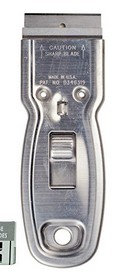First post, by GabrielKnight123
Hi all, I have an i486 DX2 CPU that must of had a heatsink and fan glued on at some point of its life, not thermal paste but glue, I know that nail polish remover works well for super glue but what should I use to remove it from this CPU? I have tried Isopropyl alcohol, circuit board cleaner, electronic cleaning solvent, zippo lighter fluid but its no good. I have tried a sharp razor blade and this got some of it but there is still some more.




